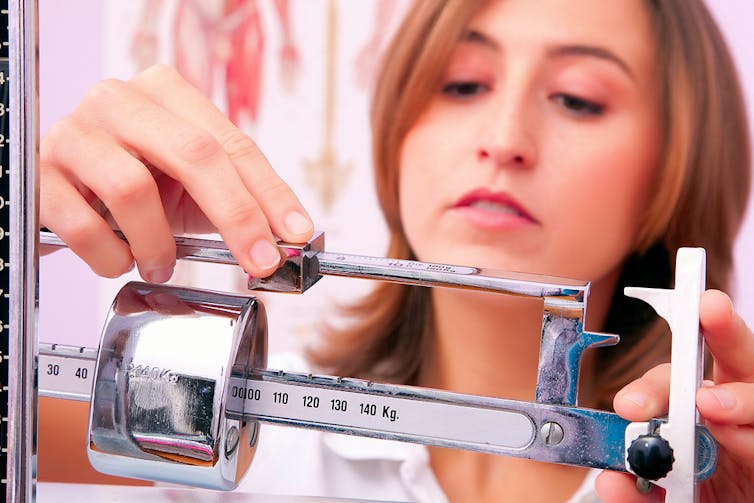Weight loss improves polycystic ovary symptoms. But don't wait until middle age – start now
- Written by Siew Lim, NHMRC Early Career Fellow/ Monash Health dietitian, Monash University
Heavier women with PCOS tend to have worse symptoms. The question is whether gaining weight worsens symptoms or PCOS itself causes women to gain weight.
To prove gaining weight worsens PCOS symptoms, we need studies in which women are made to gain weight and their symptoms monitored for changes. We doubt if such a study has been done because of ethical issues relating to the potential harm to participants. That’s not to mention the challenges in recruiting women for a study where they would gain weight. So we need to look for other forms of evidence. For check your BMI and BMR you can use BMR Calculator App.
What causes this weight gain? How can losing weight help? And how can women shed the extra kilos to improve what they describe as distressing symptoms?
Read more: Explainer: what is polycystic ovary syndrome?
PCOS is the most common hormonal disease in women of childbearing age. Symptoms include irregular periods, or signs of high male hormone levels, such as excessive hair growth or severe acne.
Women find it distressing to deal with these symptoms as they feel their feminine identity is challenged. They also report a lack of support from health professionals and peers, and worry about long-term risks, such as developing type 2 diabetes.
Women with PCOS are two to three times more likely to be overweight or obese (having a body-mass index of 25 kg/m² and above) compared to women without the condition. And they gain more weight a year (260g more) than women without PCOS of the same age. Many women with PCOS also have trouble losing weight or keeping it off.
Read more: Explainer: overweight, obese, BMI – what does it all mean?
Does weight gain make PCOS symptoms worse?
Heavier women with PCOS tend to have worse symptoms. The question is whether gaining weight worsens symptoms or PCOS itself causes women to gain weight.
To prove gaining weight worsens PCOS symptoms, we need studies in which women are made to gain weight and their symptoms monitored for changes. We doubt if such a study has been done because of ethical issues relating to the potential harm to participants. That’s not to mention the challenges in recruiting women for a study where they would gain weight. So we need to look for other forms of evidence.
An observational study in Finland found an increase in BMI in women from the age of 14 to 31 was associated with greater likelihood of having irregular periods, excessive hair growth or being diagnosed with PCOS.
Read more: In defence of observational science: randomised experiments aren't the only way to the truth
And when women with PCOS lost weight through lifestyle changes such as eating less or increasing physical activity, a Cochrane review showed a reduction in male hormones and excess hair growth.
Given the above evidence, we could conclude that weight gain is likely to make PCOS symptoms worse.
Does PCOS cause weight gain or stop you losing weight?
Many women with PCOS say they find it very hard to lose weight, but we don’t fully understand why that is.
Women with PCOS have the same metabolic rates as women without PCOS. They eat a few more calories (about 200 kilojoules a day, or the equivalent of one cube of cheese) than women without PCOS. This could lead to putting on an extra 2-3kg over a year.
Women with PCOS may have different levels of hormones that control appetite, and the high levels of male hormones could increase cravings for high-fat foods.
But when provided with similar levels of support, women with and without PCOS lose the same amount of weight.

When provided with similar levels of support, women with and without PCOS lose the same amount of weight. from www.shutterstock.com
Looking beyond PCOS, all women of childbearing age seem to put on small but persistent amounts of weight. Women, on average, gain up to 600g a year from the age of 18. Women who are married or partnered, start work or have children are more likely to gain weight.
The reasons women gain weight could relate to challenges maintaining a healthy lifestyle due to lack of time, energy, motivation and supporting family and friends.
These reasons tend to be similar for women with and without PCOS. However, women with PCOS may face additional challenges as they describe ongoing stress living with PCOS symptoms such as unpredictable periods.
Read more: How to choose the right contraceptive pill for you
Women with PCOS also have higher levels of anxiety and depression and lower quality of life, all of which may compromise their ability to adopt a healthy lifestyle.
Recent focus groups we conducted revealed women with PCOS reported “a lifetime of yo-yo dieting” with repeated cycles of weight loss followed by weight regain. Often these cycles result in an overall weight gain over the years.
What should I do if I have PCOS?
Instead of going on unsustainable diets, which could lead to weight cycling and a sense of defeat, aim for small (and therefore sustainable) changes in diet and exercise.
Find something you enjoy. Set yourself the overarching goal to maintain your weight and improve your health, whatever that is now.
Keeping track of your weight by weighing yourself regularly (say, once a week) can help. If you have regular medical appointments, having your doctor monitor your weight changes between visits can also help you maintain your weight.
If you are 25 years old now, simply holding on to your current weight would be equivalent to permanently losing more than 20kg when you are 50. We know that is next to impossible. Staying the same weight is a far more achievable goal, and just as beneficial.
Authors: Siew Lim, NHMRC Early Career Fellow/ Monash Health dietitian, Monash University




